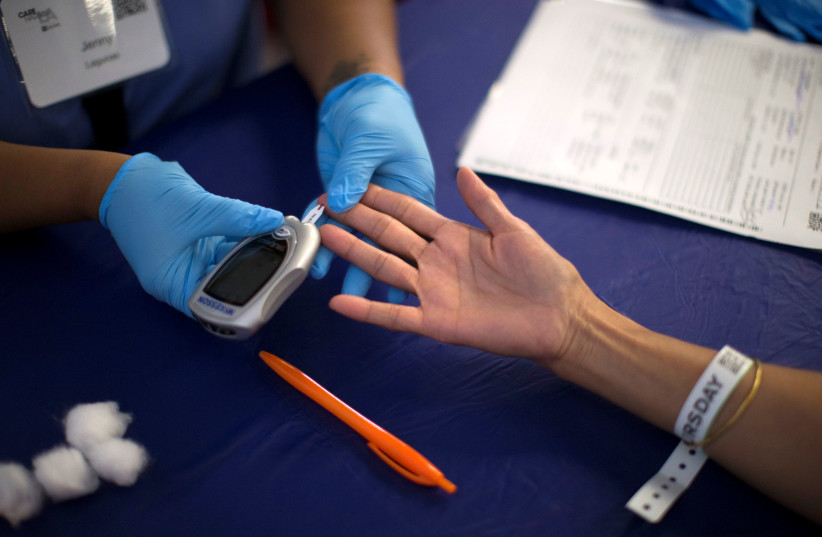How to approach a prediabetes diagnosis
Israel is home to more than half a million diabetics, as well as hundreds of thousands of others on the verge of diabetes. Many who are pre-diabetic may not even be aware of it. If you have been diagnosed with prediabetes, it means that your blood sugar levels are not high enough to be classified as type 2 diabetes, but they are high enough to indicate a need for change. So what changes should you make in your life?
A normal fasting sugar level is below 100 mg/dl, while the level of a person with prediabetes is between 100 and 126. Once the levels are above 126, it is classified as type 2 diabetes. This indicates that the body resists the action of insulin or does not produce enough of it to maintain normal blood sugar levels. Other names used to describe prediabetes are impaired fasting glucose, impaired glucose tolerance and latent diabetes.
Carbohydrate-rich foods raise blood sugar more than other foods. During digestion, the pancreas produces insulin, which then binds the sugar in the blood and takes it into the cells as a source of energy. When you are diagnosed as prediabetic, sugar begins to accumulate in the bloodstream instead of fueling the cells. This condition occurs when insulin resistance occurs, which is believed to be the number one cause of prediabetes.
A healthy weight allows insulin to work more efficiently and can help keep blood sugar in the normal range. This is one of the reasons that a healthy diet and regular exercise are the best ways to help bring blood sugar levels back into a normal range.
What factors increase the risk of developing pre-diabetes?
The same factors that may increase a person’s risk of developing type 2 diabetes may also increase the risk of pre-diabetes, such as:

- Obesity or being overweight
- Abdominal obesity
- Family history of diabetes
- Sedentary lifestyles
- Age 35 or older
- Previous diagnosis of gestational diabetes
- High levels of triglycerides in the blood
- High blood pressure
- Lack of sleep
- Skipping breakfast
- Staying up all night and damaging your biological clock
When should it be checked?
If you are 35 years of age or older, you should check your fasting blood sugar level every year during your physical exam. If you are a woman who previously had gestational diabetes, it is essential to check your blood sugar level every year, as this increases the risk of developing prediabetes or type 2 diabetes.
What are the symptoms of pre-diabetes?
People often don’t know they have prediabetes because they may not experience any symptoms.People with prediabetes or especially type 2 diabetes may experience some of the following symptoms:
- Tiredness
- Blurred vision
- Frequent urination
- Increased thirst
- Increased hunger
What are the next steps?
After diagnosis, you may be referred to a diabetes dietician who can customize a plan to help you manage your health and well-being.
You will also learn lifestyle skills to manage prediabetes and type 2 diabetes. This may include meal planning, exercise, medication management, stress relief, and working on a proper sleep routine. People with prediabetes may be able to significantly prevent or delay the development of type 2 diabetes through lifestyle changes, including achieving and maintaining a healthy weight.
For those whose sugar fluctuations are high, it is highly recommended to use a continuous glucose meter and regularly monitor the sugar levels during the day, preferably with a continuous glucose meter that does not require a finger stab, which will reflect the state of the sugar levels at any given time and also help to understand how foods affect the sugar levels.
It is important to know that most pre-diabetes treatment programs do not include medication or routine blood sugar monitoring, but self-work to change a healthy and balanced lifestyle.
What are the consequences of diabetes?
Diabetes can have long-term health consequences, and the risk of developing type 2 diabetes is higher if you have prediabetes, and this increases the health risk for:
- Heart disease
- Stroke
- Eye damage, including blindness
- Amputation of limbs
- Renal failure
In any case, you should talk to your doctor if you have questions or concerns about your sugar levels, or if you develop any symptoms of type 2 diabetes.
Prof. Julio Weinstein is the director of the diabetes research unit at Wolfson Hospital and a senior diabetologist at the DMC Diabetes Center.





Comments are closed.